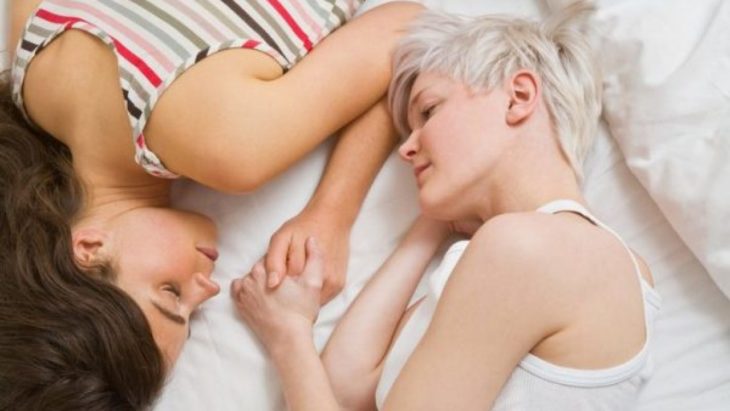One of the things about being a little different from society’s standard is that you tend to seek out and consume the kinds of things that you see your reflection in. This is why “The L Word” stayed on the air for as long as it did. This is also why Jews still go to films by Adam Sandler. Even when it’s awful, it represents you in some way and you want to stand by it. While realizing my sexuality, I seeked out anything that I could relate to. This resulted in an unhealthy love for t.A.T.u. and sneakily watching “Kissing Jessica Stein” on HBO while my mom was sleeping. Though that detail reflected my own shame more than fear of my mom’s judgement, since I’m pretty sure that we watched that movie together once, as well as every episode of “The L Word.”
“Kissing Jessica Stein” was my first exposure to an actual lesbian relationship as the main storyline on-screen. A straight girl tries out dating a bisexual girl after tiring of her male dating prospects, struggles with female intimacy, coming out, and then after moving in with her girlfriend and being accepted by her family, finds herself sexually unsatisfied, ends her relationship, and starts dating her college boyfriend. This is a pretty bleak rom-com for a 12-year-old girl trying to understand her sexuality. This was nothing like “Notting Hill.” Every time I watched the movie again, I had to stop before the last 15 minutes. It was too depressing and I wanted to stick to the happy ending that I aspired to have. Aside from being a pretty compelling argument against being gay, this was also the first time I was exposed to “lesbian bed death.”

Source: afterellen
If you’re not familiar, the concept of lesbian bed death is as commonplace a lesbian stereotype as U-Haul jokes and softball. It’s the idea that lesbians don’t actually have sex and that monogamous lesbian relationships are basically like best friends that have sleepovers every night. This originated from a very old and widely-criticized survey with a very constricting definition of what sex entails and a sample that was too small to accurately define sexual trends for an entire group of people. Still, the stereotype plagues the lesbian community and, at age 12, I was already actively resolving to never experience it. To me, lesbian bed death was like a looming Dementor just waiting for a weak moment to swoop and suck out your soul. So, as an adult, my Expecto Patronum came in the form of “Please don’t bring a book to bed,” “Why are you wearing pajamas?” and “No, we can’t get a cat.” In hindsight, I am very grateful that my significant others still put up with my neurosis.
Lesbian bed death is the creeping fear of lesbians everywhere, and it’s talked about all the time — how it happens, how to avoid it, and how to fix it. Autostraddle recently conducted a reader survey of the sexual behavior of queer women and discovered that queer women are having just as much sex as their heterosexual counterparts and for longer periods of time. Queer women also have more orgasms and greater sexual satisfaction. Now seems as good a time as any to insert this obligatory GIF:

But, if the numbers don’t lie, clearly lesbian bed death doesn’t exist. So, why is it still such a prevalent topic in queer monogamous relationships?
One of the things about lesbian relationships is that when you first start having sex, you don’t stop. You can have sex forever when no one has that post-ejaculation drowsiness. You have so much sex that you become a terrible person — you cancel on your friends, you show up late to brunch, you don’t make it to IKEA even though you really need to buy a bedframe, and you see the sunrise a lot more often than a person with a 9-to-5 should. At some point, you have to slow down and go back to real life, show up to work on time, and call your parents. When they finally do stop going to bed at 7 a.m., every lesbian starts sweating that they might be headed down that path towards bed death. A quick survey of my social circle, asking the question, “Have you ever had lesbian bed death?” included a lot of anecdotes like “No, but one time, we didn’t have sex for two weeks and I panicked and bought a book about it.” There comes a normal point in every longterm relationship where you realize your partner is going to become a constant thing in your life and you no longer feel like you need to consume them as if the world is going to end next week. We treat that shift in sexual activity like it’s the beginning of the end and we give lesbian bed death the power to be a self-fulfilling prophecy.
Queer relationships don’t need to be validated or, in this case, invalidated by comparing them to heterosexual relationships. First, it seems stupid to value relationships based solely on sex. Love is weird and there are no hard or fast rules to a successful partnership. You also can’t quantify sex through frequency or duration; it’s a pretty narrow-minded perspective to not focus on sexual satisfaction as the metric to sexual success. A heterosexual couple that has 30-minute long sex sessions three times a week is no better than a homosexual couple that has sex for an hour and a half once a week if no one is getting off. These kinds of studies also don’t take into account that hetero sex after a certain age is more than just connecting with your partner. People want babies and it’s a lot easier to fit sex into your schedule when it leads to the next stage of your life plan.

Source: buzzfeednews
The biggest problem with the concept of lesbian bed death is that it’s given so much weight that we lose sight of the real issues. Personally, I wish that I had spent more time concerned with my partner’s emotional well being than I did trying to fix my “lesbian bed death.” I’ve been quick to diagnose a problem without realizing that the loss of my partner’s sex drive could be something bigger than a cliche. It’s easy to chalk up your problems to a widely known stereotype and accept the loss rather than evaluate what is actually happening underneath the lack of nookie and try to figure out how to resolve it. With that, I’ve ended up ignoring my partner’s real problems and instead tried to throw a bunch of fixes at it based on the advice of sex therapists writing about a phenomenon that, apparently, doesn’t even exist.
If there’s anything that I’ve learned about “lesbian bed death” it’s that it’s just as likely to happen to me as it is to my dad. It’s a stereotype that is no different than the sitcom wife that always has a headache. Lesbians are just lucky that there’s a snappy name they can use in place of explanations like “antidepressants kill your sex drive” or “your insane work schedule is affecting your personal life” or “Postpartum depression blows.” When sex decreases, straight or gay or anything in between, we should spend less time comparing ourselves to others and more time tending to what’s really going on outside the bedroom in order to fix what’s not happening between the sheets.
Original by: Morgan Cohn
